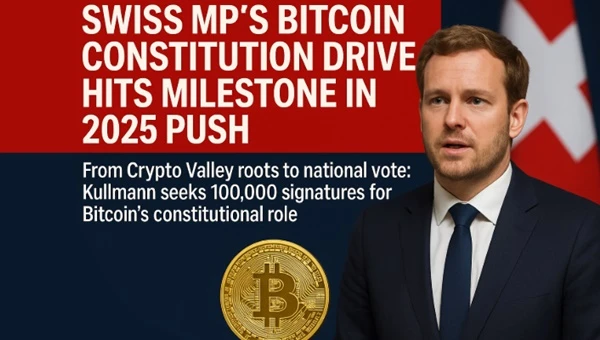

A member of the EDU party representing Bern, Kullmann introduced the “Bitcoin Initiative” in January 2025 under the title “For a Financially Strong, Sovereign, and Responsible Switzerland.” It calls for amending Article 99 of the constitution, governing the Swiss National Bank, to mandate holding Bitcoin alongside the nation’s 1,040 tons of gold, worth over 80 billion francs.
The measure was published in the Federal Gazette on January 1, triggering an 18-month signature period before parliamentary and cantonal debates. If approved, Switzerland could become the first nation to constitutionally back Bitcoin as part of its financial reserve.

Switzerland’s digital finance foundations long predate Kullmann’s initiative, providing fertile ground for his ambitions. Since 2017, Zug’s “Crypto Valley” has become home to more than 1,000 blockchain firms, including the Ethereum Foundation, and attracted 4.5 billion Swiss francs in investment by 2024.
The Financial Market Supervisory Authority (FINMA) broke new ground in 2018 by introducing token classification standards that simplified compliance for exchanges and ICOs.
This framework helped Switzerland process 22% of global crypto trading volume last year, according to Chainalysis, strengthening the franc’s reputation as a safe haven amid eurozone instability.
Kullmann leverages this foundation to position Bitcoin as a logical next step. He highlights the Swiss National Bank’s (SNB) 850 billion francs in reserves, largely held in euros and dollars, which have lost roughly 4% of value to inflation since 2022.
Bitcoin’s finite 21 million-coin supply, he argues, offers the same crisis-buffering strength that gold provided during the 2008 downturn. Momentum for his cause gained early traction in March 2024, when Bern’s cantonal parliament voted 85–46 to study Bitcoin mining powered by surplus hydropower.
With 62% of Swiss electricity already hydro-based, and excess often sold at negative rates, mining has proven profitable, yielding 2.5 million francs from 60 BTC mined in Zug pilot projects by mid-2025.
Support cutting across party lines suggests Bitcoin’s appeal in Switzerland may be more pragmatic than ideological.
Central Bank Resistance and Public Divide
Not everyone’s on board, least of all the Swiss National Bank. Its president, Martin Schlegel, warned in July 2025 that Bitcoin’s wild 40% swings in Q2 could wreck the SNB’s price-stability goals. He reminded lawmakers that reserves must stay liquid for emergencies, like the 130 billion francs used to support the franc back in 2011, and that holding BTC could invite lawsuits if prices tank, just as El Salvador faced after a 20% loss post-2021.
The Federal Council echoed the warning mid-year, urging rejection to protect Switzerland’s 8.7 million residents who depend on the franc’s steady value.
Polls show voters share that caution. A gfs.bern survey in September 2025 found 62% wary of the plan, especially in Basel and Geneva, where people preferred diversifying with euros over “speculative tech.” The political left has also lined up against it, still stung from a failed 2023 crypto wealth tax, they argue the idea mainly benefits the top 1%, who own 70% of the country’s digital assets.
Kullmann, though, fires back with case studies. Bhutan’s 13,500 BTC holdings from green mining have boosted its reserves 12% since 2023, and Germany’s 2024 sale of seized Bitcoin raised €3.2 billion without shaking markets. With Bitcoin ETFs holding $140 billion globally, he says, the question isn’t risk, it’s readiness.
Global Parallels and Domestic Momentum
Kullmann’s push comes amid global moves toward sovereign crypto adoption. The U.S. BITCOIN Act targets 1 million BTC in five years, Portugal grants miner tax breaks while France imposes a 35% levy, and Brazil trials BTC-backed bonds.
A 2024 Dutch plan for 5% central bank reserves in BTC was sidelined by ECB digital-euro talks.
At home, Kullmann’s 2024 mining study led to a speech at Lugano’s PlanB forum (Oct 2025), urging daily Bitcoin use to avoid fiat “failure.” A viral TV parody in May 2025 brought 500,000 views and 20,000 new signatures.
The 2021 sovereign-money referendum failed 76–24%, but Kullmann’s effort benefits from new demographics: 55% of Swiss under-35s now hold crypto (Statista). This generation may yet turn satire into sovereignty.
Looking Ahead
The initiativebtc.ch campaign is picking up pace, using Crypto Valley meetups and crypto influencers. Backed by Dennis Porter of the Satoshi Action Fund, who calls it a “long-shot end-zone play,” the effort targets expats and renewable advocates, tying Bitcoin to 3 billion francs in annual green energy exports.
If approved, the first step would set 4% of SNB reserves, about 34 billion francs, into Bitcoin. For Kullmann, it’s a safeguard against de-dollarization, as BRICS nations have raised gold holdings 20% since 2022.
With support climbing and debate intensifying, Switzerland stands at a crossroads: will its democracy crown Bitcoin as a constitutional reserve, or keep it as an outsider’s dream?
He has worked with several companies in the past including Economy Watch, and Milkroad. Finds writing for BitEdge highly satisfying as he gets an opportunity to share his knowledge with a broad community of gamblers.
Nationality
Kenyan
Lives In
Cape Town
University
Kenyatta University and USIU
Degree
Economics, Finance and Journalism


Facts Checked by Maryam Jinadu

 Fact checked by
Fact checked by 
 eabungana@gmail.com
eabungana@gmail.com 